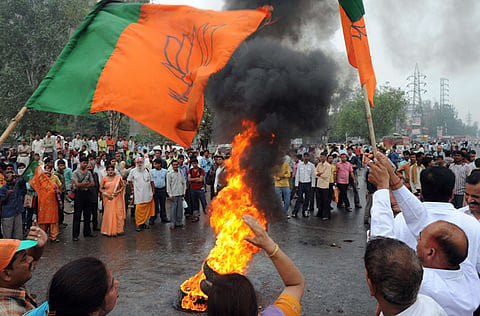Saffron terrorism rears its ugly head
The twists and turns in the Malegaon blasts case should serve as a wake-up call for Indian authorities to think about how they deal with Hindu extremists

The vice-chancellor of the Aligarh Muslim University has written to the Indian government to provide protection to his campus. He was reacting to the news that a group of Hindu extremists have planned to target the university.
Not long ago, Home Minister P. Chidambaram admitted that ‘saffron terrorism' was a fact that should be faced squarely. The initial reaction to the concept of ‘Hindu terrorism' was one of disbelief. The opposition Bharatiya Janata Party (BJP) alleged that the talk of Hindu terrorism was meant to divert attention from the massive allegations of corruption against the government.
The Rashtriya Swayamsevak Sangh (RSS), the BJP's parent body, even went to the extent of saying that "a Hindu cannot be a terrorist".
Yet Swami Aseemanand's — the main accused in the Malegaon bomb blasts — confession before a magistrate changed the tone. Aseemanand, who initially claimed that he was being framed in a government conspiracy, later spilled the beans. His confession has been recorded under section 164 of the Criminal Procedure Code and that makes it legally binding evidence.
No amount of pressure has caused Aseemanand to withdraw his statement. He named RSS leaders for the terror blasts in Ajmer, Hyderabad, Samjhauta Express and twice in Malegaon.
In May 2008, after several meetings, the group of extremists prepared the roadmap for the terrorist attacks on Hyderabad, Malegaon, Ajmer Sharif and Aligarh University. In a 26-page confessional statement, Aseemanand said: "I suggested that the first bomb should be placed at Malegaon as it is closer to our location and also has 80 per cent Muslim population. I also said that since at time of independence the Nizam of Hyderabad wanted to go with Pakistan, Hyderabad should be taught a lesson and hence a bomb should be placed there."
Aseemanand also admitted that he chose Ajmer Sharif "where Hindus go in big numbers… so that Hindus are scared of going there". He chose Aligarh Muslim University because many Muslim youths study there. "My suggestions were accepted by everyone", he said in his confession.
The cloak and dagger story in which even a former intelligence officer was involved is not about a few persons from the RSS. The plot goes deeper. That the Central Bureau of Investigation (CBI) is trying to unravel it is not adequate. The government has to devise means to fight against Hindutva philosophy. For a secular country, any fundamentalist thought is an attack on the very roots of its foundation.
Fundamentalism spread in Pakistan — and it is spreading in Bangladesh — because neither the government nor the liberal elements thought much of it in the beginning. Only when the attacks multiplied and the death toll mounted did Pakistan wake up.
India has to take the menace seriously. The reopening of the Malegaon blasts case is a step in the right direction.
On December 22, 2006, the western Indian state of Maharashtra filed a 2,200-page charge sheet against 13 men in the special court. However, following pressure from political parties, then Maharashtra deputy chief minister R.R. Patil announced the transfer of the case to the CBI for a fresh probe. The CBI said that it had no fresh evidence in the case. The new material should help the agency pursue the case vigorously.
Life-changing experience
It must be an act of providence that pricked Aseemanand's conscience. When detained in a Chanchalguda jail, Aseemanand met a Muslim man serving a sentence for his alleged role in the Malegaon blasts. The Muslim prisoner took care of Aseemanand when he fell ill. He bore no rancour or remorse. Moved by this chain of events, Aseemanand reportedly decided to make a clear breast of his involvement in the terror plot.
"The Muslim boy Kaleem pierced my conscience. I understood that love between two human beings is more powerful than the hatred between two communities" he said in his confession. He has reportedly written to the President of India and the President of Pakistan, admitting his crimes and seeking penance.
It is a shame that the 13 Muslims imprisoned on charges of carrying out the Malegaon blasts have not yet been released. Only Kaleem has been freed.
The Maharashtra police are embarrassed. Their explanation is that they went ‘wrong'. Those who prosecuted them and even produced ‘the accomplice', who became a government witness, should be punished.
But it is a futile demand because I have not seen anyone from the police ever being punished for fabricating a case or prosecuting the innocent.
Isn't it time both India and Pakistan join hands to eliminate terrorism from the region? The argument by one country that it does not face such a terrible situation as the other does is futile. True, there is a shade of difference — but only a shade. Maybe, India has not yet been a victim of open terrorism as Pakistan has from the jihadis from within and without. But India now has Hindu terrorists and Islamist terrorists, apart from the Maoists.
This situation has the potential of creating large-scale destruction.
Kuldip Nayar is a former Indian high commissioner to the United Kingdom and a former Rajya Sabha member.


